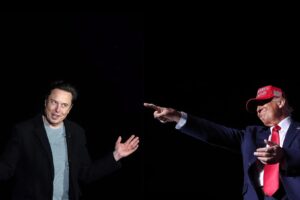It might not sound like the most obvious premise for a hit show, but a musical set in a gender neutral public toilet has become one of the hottest tickets at this year’s Edinburgh Fringe.
Kyla Stroud had spent several years struggling to make a name as a singer-songwriter when the pandemic prompted a rethink.
“Through lockdown, I really fell out of love with the music industry,” says Kyla, who also fell into “a really low mental health dip”.
“I was just trying to find some joy again in life and asked myself, ‘When was I last happy? When I was doing am dram [amateur dramatics] when I was a teenager. Maybe I should try and write musical.’
“I knew it was going to have to be a simple concept. So I thought, well, what would be interesting to me right now?”
After lockdown pushed everyone physically apart – and with many people emerging more psychologically splintered after it ended – Kyla decided the musical should throw a group of strangers together.
“Let’s find a way to make people who shouldn’t connect, or don’t want to connect… let’s make them connect, and find their similarities, and find their compassion.”

Discussions about gender identity were also increasingly in the air, and were close to home for Kyla, who uses they/them pronouns.
So Public – The Musical was born. The show sees four fictional strangers – with varying outlooks, predicaments and pronouns – get trapped together in a gender neutral public toilet.
There is Zo (played by Annabel Marlow), a privileged Gen-Z activist who’s on her way to lead an anti-pesticide protest – Operation Pollination for the Nation.
Laura (Alicia Corales) is non-binary, non-confrontational, and has just discovered their girlfriend has been unfaithful.
Finlay (Hugo Rolland), a gay man, has crippling anxiety and an appointment to stop his Universal Credit from being cut off.
He is close to Kyla’s heart – the musician has a panic disorder and was on Universal Credit during the pandemic. “They were very much intertwined.”
Finally, Andrew (Andrew Patrick-Walker) is a middle-aged financial worker and cycling enthusiast who is bemused when asked for his pronouns. “I’m a bloke.”
‘Brilliantly observed comedy’
Not only is the WC a clever location in which to play out topical conversations about identity and ideology, it’s also a ripe setting for humour and tension as the public convenience becomes a pressure cooker.
It has had some rave reviews at Edinburgh’s annual arts festival, which has previously been the launchpad for hits like Fleabag and Six.
The Evening Standard called it “exactly the sort of show you hope to come across at the Fringe: funny, messy, hugely imperfect but so packed full of talent and great ideas that it really doesn’t matter”.
Parts are “a bit too idealised, a bit preachy”, but “by the time those lessons in mutual understanding arrive, we’ve been so pulled in by the unrelenting, brilliantly observed comedy and the punchy pop songs that it all seems so much more palatable”, the paper’s Tim Bano said.
US theatre site Playbill enthused that the show has a “fantastic score” and “creates musical theatre magic”.
Critic Jeffrey Vizcaino wrote that it would be the show he would “go back to New York City and brag about [seeing] for months if not years”.
And The Stage awarded Public five stars. “The lyrics are witty, pertinent and often quite moving, while Stroud’s diverse score drives the narrative along in perfect unison,” reviewer Paul Vale said.
“The icing on the cake is the performers, whose vocal talents ignite Stroud’s vibrant score with a thrilling intensity.”

Kyla created the show with a group of collaborators – twin sister, co-writer and choreographer Natalie; director, co-writer and co-producer Hannah Sands; and musical supervisor Olivia Zacharia.
The process of writing became more of a personal journey than they expected.
“Both Hannah and I, our pronouns have changed throughout [making] this show,” Kyla says.
“It’s not because of the show, it’s because the conversations we had in the writing room have enlightened us and made me realise, oh yeah, half the time my pronouns were for someone else and I was filtering for other people to make it easier.
“Now I feel like I know who I am more, and that’s what we want for our audiences as well.
“We’re not trying to change who anybody is, we’re trying to help people figure out who they are, or be OK with who other people are.”
Opinionated
The musical tries to avoid taking sides in a culture war, though – all the characters are well-rounded with depths that are revealed as the show goes on.
If anything, Zo is the biggest caricature, with overzealous attempts to uphold the new rules of identity politics that can do more harm than good.
“She’s very opinionated and is quite quick to point out when someone gets things wrong,” Kyla says.
“Hannah and I spoke a lot about this as queer people, about how a lot of queer people when, understandably in a defensive state, are quite quick to do that.
“I’ve definitely done it a lot, especially with my parents. I’m often the one to say, ‘No, you can’t do that. You’ve got that wrong.'”
Writing Zo was “a bit of a lesson to all of us”, Kyla says. “That character can also be problematic and alienate people.”
‘Not here to provoke’
Single-sex toilets themselves are a fierce ideological battleground.
The show’s run has coincided with a government announcement confirming plans to “reverse the rise of gender-neutral toilets as part of wider efforts to protect single sex spaces”.
The rise of such facilities has led to “increasing waiting in shared queues, decreased choice and a limitation on privacy and dignity for all”, they said.
While the creators say they support gender neutral bathrooms, they also say the musical itself doesn’t seek to comment on that debate beyond using one as a useful backdrop.
It “becomes irrelevant”, Natalie says, in a show that’s “about important conversations, connection, and how we can move forwards in a way that means we don’t close off to people that don’t agree with us all the time”.
Kyla insists theirs is a message of finding tolerance. “We want to be part of a queer community that’s all about love and compassion and understanding.”
Hannah says: “We’re not here to provoke you or shock you to a degree that you feel like you’re being attacked. Let’s just talk.”
“While listening to some absolute bangers,” Natalie adds.
The show is packed with memorable songs, and it probably won’t be long before many more people are humming them.
By moving from struggling singer-songwriter to musical theatre maestro, Kyla seems to have found their forte.










